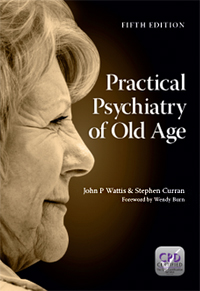The Practical Psychiatry of Old Age
Tue, 30 Jul 2013 11:20:00 BST
Professors launch fifth edition of respected text
 FIRST published almost 30 years ago, Practical Psychiatry of Old Age broke new ground and rapidly established itself as a key textbook. Now its fifth edition, written by two University of Huddersfield visiting professors, has been published and it keeps pace with enormous changes in the field.
FIRST published almost 30 years ago, Practical Psychiatry of Old Age broke new ground and rapidly established itself as a key textbook. Now its fifth edition, written by two University of Huddersfield visiting professors, has been published and it keeps pace with enormous changes in the field.
The authors are professors John Wattis and Stephen Curran (pictured together at their inaugural professorial lecture), who are both vastly experienced practitioners in the field of psychiatric care for the elderly – which includes dealing with depression and dementia.
Professor Wattis was co-author of the first edition, in 1986, and was joined by Professor Curran later in the series. Since the books started to appear, the medical landscape has changed.
“When we started, old-age psychiatry wasn’t properly recognised as a speciality,” said Professor Wattis.
“But it was beginning to develop and I wrote a series of articles for a magazine called Geriatric Medicine, to help people who were training in old-age psychiatry. The project developed from there.”
 Now Practical Psychiatry of Old Age is established as the ideal clinical primer for trainees or as a day-to-day reference book for healthcare professionals working with the elderly. New editions have kept pace not only with the latest treatments and cast studies, but also with vast changes in the organisation of the health service.
Now Practical Psychiatry of Old Age is established as the ideal clinical primer for trainees or as a day-to-day reference book for healthcare professionals working with the elderly. New editions have kept pace not only with the latest treatments and cast studies, but also with vast changes in the organisation of the health service.
Among the most important changes since the book first appeared have been a wider range of treatments for depression becoming available, said Professor Wattis. These include new medicines and also Cognitive Behavioural Therapy (CBT).
“This was known of at the time of the first edition, but it has taken a very long time to get it practically available. There are still problems in availability of CBT for old people, but we have a lot of new anti-depressants which are less toxic than the older ones.
“The other great thing has been the advent of anti-dementia drugs which have enough effect to be worth using. They don’t stop the disease, but they can relieve the symptoms.”
Professor Wattis said that before psychiatry for older people achieved recognition as a discipline, the issue of geriatric depression was marginalised.
“There was a tendency to think that if you are old and mentally ill you must be ‘going senile’, as people put it. So there was a bit of a tendency to go for what a colleague called ‘removal and storage’ rather than any active intervention. The advent of the speciality brought a much more active approach to depression in older people as well as a more active approach to providing the best possible care to people with the various dementias.”
Recent innovations have included memory clinics which also supervise the use of the new drugs for patients who are suffering from Alzheimer’s.
 Practical Psychiatry of Old Age has also spawned a series of books edited by Professors Wattis and Curran. These include Practical Management of Affective Disorders in Older People, Practical Psychopharmacology in Old Age and Practical Management of Dementia: A Multi-Disciplinary Approach. A recent addition to the sequence has been Practical Management and Leadership for Doctors (pictured).
Practical Psychiatry of Old Age has also spawned a series of books edited by Professors Wattis and Curran. These include Practical Management of Affective Disorders in Older People, Practical Psychopharmacology in Old Age and Practical Management of Dementia: A Multi-Disciplinary Approach. A recent addition to the sequence has been Practical Management and Leadership for Doctors (pictured).
“We regard ourselves as doing our best to provide books that are as academically sound as possible, but at the same time dealing with the practical realities of delivering services in the modern world,” said Professor Wattis.







